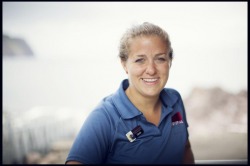Ocean Ambassadors: MUN Grad Students Greet Thousands at the Ocean Sciences Centre

Ocean Ambassadors: MUN Grad Students Greet Thousands at the Ocean Sciences Centre
The Ocean Sciences Centre teems with life on a misty summer morning. Tourists take in the view of Logy Bay. A family climbs the steps leading to the tanks that house three harp seals. Kids crowd around the saltwater touch tanks located outside the OSC’s main building, peer through the glass to see the flounder hiding in the mud, and reach in to stroke a starfish or hermit crab.
“What’s that stuff?” asks a boy as he leans over the aquarium, his nose hovering inches above the water.
“It’s two kinds of seaweed,” replies Sarah Walsh. “Just feel how different they are.” She dips her fingers in, and the boy does the same.
Another boy points to the blue lobster in an adjoining tank. “Can I take that lobster home and eat it?”
“No, you can’t,” says Sarah with a smile.
As an interpreter with the Marine Public Education Program, Sarah Walsh has to be ready for any and all questions. The OSC’s touch tanks and harp seal facility attract over 18,000 visitors every summer. Thousands more get a glimpse of the underwater world via the travelling touch tank, which visits groups around the city and communities outside St. John’s.
Although most of the visitors come from Newfoundland and Labrador, many are unfamiliar with the spectacular variety of the North Atlantic ecosystem.
“I love teaching people about the ocean, especially the ocean around them,” says Sarah. “Most of them know about creatures like sea stars and sea urchins. But they might be surprised by the sea cucumber or sea peach. It really opens their eyes.”
As a girl, Sarah spent every summer boating with her family, always eager to discover more about the sea. Today she sees that same spark of curiosity when a child lingers at the touch tanks, wide-eyed and full of questions.
“Most of them just want the cool facts, or they go straight to the seals,” she says. “But then you get kids who really want to learn. They want to stay all day long, to get their hands in and touch things and pick up things.”
Some of those curious kids might find themselves back at the OSC by participating in the Oceans Learning Partnership, an educational initiative that gives elementary and high school students a hands-on introduction to marine science and technology. OLP programs are designed and delivered by a network of scientists and educators from Memorial University, the Marine Institute, and Parks Canada, with support from participating schools and funding by the Hebron Project. The Ocean Sciences Centre is a key location in that program, with laboratory space currently being renovated to accommodate OLP students.
“I wish we had something like that when I was in high school,” says Sarah. “But there wasn’t much about the ocean in my school. I didn’t know you could make something of yourself in marine science.” When she began studying at Memorial, she switched programs twice before she realized that the right career was the one she had been preparing for since childhood, when she spent every summer on her father’s boat. “It was obvious once I found it. I always used to tell my friends I wanted to be a marine biologist. All my life I wanted to work on the ocean.”
Sarah holds a Bachelor of Science from Memorial and is working towards a joint Diploma/Bachelor of Technology in Ocean Mapping at the Marine Institute. She looks forward to a career that will draw on her fascination with the wide-ranging marine environment.
“I don’t want to focus on one issue or one species. The ocean mapping program gives me the ability to specialize while allowing me to work with different people on different issues.”
In the meantime, she enjoys spending the summer at the Ocean Sciences Centre, where her passion for the sea has found a thriving hub of education and research.
Meet more ocean ambassadors and learn more about the OSC’s public engagement programs at http://olp.oceansnl.net